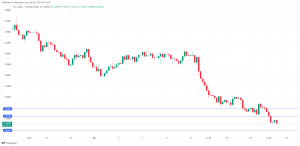Economics
Seven Points On Investing In Treacherous Waters
Seven Points On Investing In Treacherous Waters
Authored by Charles Hugh Smith via OfTwoMinds blog,
What’s truly valuable has no price and…

Seven Points On Investing In Treacherous Waters
Authored by Charles Hugh Smith via OfTwoMinds blog,
What’s truly valuable has no price and cannot be bought.
If all investments are being cast into Treacherous Waters, our investment strategy must adapt accordingly. Once we set aside denial and magical thinking as strategies and accept that we’re in treacherous waters, a prudent starting point is to discern the most consequential contexts of all decisions about where and how we invest our time, energy and capital.
The most consequential global context is to first and foremost “invest in yourself”: invest in forms of capital that cannot lose value (for example, integrity, skills and experience) and assets that are not dependent on fluctuations in valuations for their utility. This is the essence of Self-Reliance.
For example, tools retain their utility regardless of their current market value, and so does a house as shelter and yard to grow food. Whether the value drops to $1,000 or soars to $1 million, the property provides the same utility of shelter and sustenance.
In other words, the mindset of speculation–buy low and sell high to accumulate as much money as possible–is not the only context to consider.
A second global context is that speculative winners–assets that rise sharply in value–will increasingly be targets for “windfall” and/or wealth taxes, as well as capital controls, such as limits on selling. If you log a 500% gain, then paying a wealth tax is a small price to pay for such a handsome gain. But such enormous gains will very likely be far more scarce going forward as speculative bets become net drains on capital and speculators exit because their gambling chips are gone or they realize they better conserve what capital is still left.
Meanwhile, back on the Government Ranch, the crying need for more tax revenues will become increasingly dire. As speculative bubbles pop, capital gains will dry up and blow away, and this rich source of tax revenues will have to be replaced with higher taxes and junk fees on whatever income and assets are available for “revenue enhancement,” ahem.
A “special assessment” tax on those worth $100 million or more will be approved first. The bar will then be lowered to $10 million, and then $1 million, which will of course include all assets, the family home, 401Ks, pension plans, small businesses, etc., and any assets held overseas. Civil penalties for stashing assets in dodgy offshore tax havens will of course increase concurrently. Purchases of cryptos and precious metals will be closely monitored / scrutinized.
Yes, the billionaires and corporations will remain untouchable due to their heavy buying of influence on the Political Action Auction ™, but the plump medium-sized fish who can’t swing millions in political contributions and legal fees will be inviting targets.
This generalized increase in taxes and junk fees on the wealthy and high consumption households will favor those who figure out how to live well on less income and fewer high-value assets.
A third global context is that simple bets on sectors may not provide the easy, stable returns that characterized the past 40 years. Those who rotated into “hot sectors” and cashed out when everyone else jumped in did very well.
This mindset is still ubiquitous. Many are calling for a commodity super-cycle that will deliver reliable gains to anyone investing in energy/commodities for years or decades to come. Others are flooding back into Big Tech or emerging markets.
Such simple trend-following sector bets will not work as reliably going forward, for several reasons. One is that artificial scarcities tend to be followed by gluts that crush valuations.
Another is the emergence of asymmetries within sectors. In other words, a rising tide will no longer not raise all boats.
Per a quote from Nassim Taleb: “Finance has three simple rules: maintain a clear mind, figure out asymmetries, never talk to idiots.”
What are asymmetries? In shorthand, “winners take most.” Put another way, the winners in each sector may garner the majority of the gains within the sector, as the winners have figured out a strategy to navigate treacherous waters.
Those pursuing old strategies will either lose or reap meagre gains.
The most successful investors / speculators will dig into companies, looking for asymmetries in financial assets, expertise, management, etc.–the traditional tools of stock pickers.
Buying index funds and ETFs to ride the tide higher will mean losing as the speculative tide ebbs.
A fourth context is that speculations in assets with no real-world utility such as NFTs have run their course and the gains will flow to companies producing real-world goods/services with essential utility.
This may be seen as part of the global trend of re-industrialization / reshoring / friendshoring.
A fifth global context is that one tool to discern productive asymmetries is to ponder what the wealthy value. The wealthy have the means to buy the most experienced advice and the incentive to protect capital, so what they pursue is worthy of consideration. This doesn’t mean they will always be right, it simply means that just as keeping an eye on the herd is useful, so too is keeping an eye on the “some are more equal than others” group.
Real estate and housing is one example. The global housing bubble is finally popping, and house valuations have a long way to drop to reach historic trendlines.
That said, enclaves with all the attributes valued by the wealthy–safety, good schools and healthcare, local sources of energy and food, attractive natural settings and distance from decaying urban cores–will drop less, or could even retain their value due to the relative scarcity of places that meet these high standards.
A sixth global context is the value of maintaining a low profile that doesn’t telegraph your wealth, what’s known as the “gray person” strategy: blend in with neighbors, drive average-looking vehicles, avoid any ostentation. Blend into the background so no one will look at you twice.
A seventh global context is to invest in trusted personal networks, producing essentials others will value and your community of family, friends, neighbors, small enterprises and other local connections. These have value that cannot be assessed with a market price. As I’ve said many times, what’s truly valuable has no price and cannot be bought.
Or as I’ve put it previously: “In a world besotted with the artifice of consumerism, what matters is not what can be commodified and bought but what can’t be commodified and bought.”
My Mobile Creative credo also speaks to this: trust your network, not the corporation or the state.
Trust and integrity are high on the list of what cannot be bought, and these are assets we should all leverage as the waters become increasingly treacherous.
* * *
This essay was first published as a weekly Musings Report sent exclusively to subscribers and patrons at the $5/month ($50/year) and higher level. Thank you, patrons and subscribers, for supporting my work and free website.
My new book is now available at a 10% discount ($8.95 ebook, $18 print): Self-Reliance in the 21st Century. Read the first chapter for free (PDF)
Tyler Durden
Sun, 02/05/2023 – 11:00
commodities
commodity
markets
metals
bubble

Argentina Is One of the Most Regulated Countries in the World
In the coming days and weeks, we can expect further, far‐reaching reform proposals that will go through the Argentine congress.
Crypto, Crude, & Crap Stocks Rally As Yield Curve Steepens, Rate-Cut Hopes Soar
Crypto, Crude, & Crap Stocks Rally As Yield Curve Steepens, Rate-Cut Hopes Soar
A weird week of macro data – strong jobless claims but…
Fed Pivot: A Blend of Confidence and Folly
Fed Pivot: Charting a New Course in Economic Strategy Dec 22, 2023 Introduction In the dynamic world of economics, the Federal Reserve, the central bank…






















